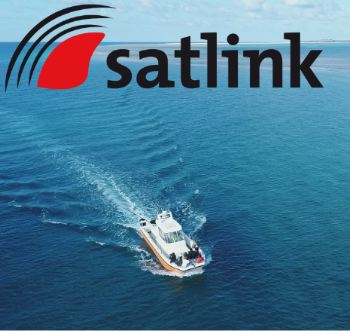|

Photo: Satlink
Satlink expands its project to reuse sustainable fishing buoys to Mozambique to boost oceanographic studies
 SPAIN
SPAIN
Thursday, September 19, 2024, 00:00 (GMT + 9)
This pioneering and unique circular economy initiative in its field is already present in more than ten countries and the three main oceans
Madrid – The ReCon circular economy project, promoted by the Spanish technology company Satlink to give a second life to echo-sounder buoys used in tropical tuna fishing, will start in Mozambique with the help of its new local partner, the Bazaruto Centre for Scientific Studies (BCSS).
The agreement signed between both entities will allow the reach of ReCon to be strengthened in the Indian Ocean through this scientific entity, which operates in its western waters, and add another 2,700 km to the coverage of this project whose objective is to prevent smart buoys from becoming technological waste as a result of marine currents or adverse weather factors.

Click on the image to enlarge
For its part, BCSS will use the recovered and reconditioned buoys and sensors to enrich the collection of oceanographic data from its Marine Observatory in Mozambique, with the aim of understanding and providing scientific data to protect the marine ecosystem of the Western Indian Ocean region.
.jpeg) Specifically, the Observatory will use these devices to enrich its oceanographic studies on temperature or chemical composition of water (for example, monitoring ocean acidification), with time series of measurements of marine biomass in the water column, to analyze its evolution and the impact of different environmental factors. Specifically, the Observatory will use these devices to enrich its oceanographic studies on temperature or chemical composition of water (for example, monitoring ocean acidification), with time series of measurements of marine biomass in the water column, to analyze its evolution and the impact of different environmental factors.
Photo courtesy of Satlink -->
Following this agreement with BCSS, the ReCon Project founded by Satlink with the help of the Australian NGO Tangaroa Blue Foundation, is already present in more than ten countries and the three main oceans (Pacific, Indian and Atlantic). In addition to Tangaroa Blue Foundation, ReCon is supported by other leading environmental organisations such as The Nature Conservancy (TNC), The Pacific Community (SPC), Project Biodiversity and now BCSS. From the fishing sector, more than 150 vessels from 25 companies and organisations are participating in the project, such as Albacora, Echebastar, Inpesca, OPAGAC/AGAC, Sapmer, Bolton Food Group, Cape Fisheries, Caroline Fisheries Corporation, Trimarine, Oakcity Tuna Fishing Corporation, Hartswater, US Pacific Tuna Group, Fairwell, Frabelle and FungKuo, among others.
.png) In addition to the waters and coasts of Mozambique, ReCon has a presence in Australia, Papua New Guinea, Micronesia, the USA (Palmyra), the Marshall Islands, the Cook Islands, Wallis and Futuna, New Caledonia and Cape Verde, with the aim of recovering, reconditioning and reusing these buoys for scientific and environmental purposes. In addition to the waters and coasts of Mozambique, ReCon has a presence in Australia, Papua New Guinea, Micronesia, the USA (Palmyra), the Marshall Islands, the Cook Islands, Wallis and Futuna, New Caledonia and Cape Verde, with the aim of recovering, reconditioning and reusing these buoys for scientific and environmental purposes.
It should be noted that the buoys targeted by the project not only incorporate echo sounders that detect the amount of marine biomass present beneath them, making them ideal for reuse in small-scale scientific studies, but also GPS technology, extending its usefulness to marking and tracking marine litter, surveillance of artisanal fishing vessels, shark monitoring or improving forecasting and alert systems for maritime safety. According to Dr. Mario Lebrato, chief scientist at BCSS, “the signing of this agreement will allow us, thanks to echosounder buoys, to incorporate cutting-edge technology into our scientific observation and research projects, while contributing to eliminating potential waste from the environment.”
(1).png) In this regard, it should be noted that, since its launch in December 2022, thanks to the ReCon Project, Tangaroa Blue Foundation has collected more than six tons of waste on the coasts of Australia, thus reducing the impact of ghost fishing, as the set of abandoned, lost or discarded fishing nets and gear is known. In this regard, it should be noted that, since its launch in December 2022, thanks to the ReCon Project, Tangaroa Blue Foundation has collected more than six tons of waste on the coasts of Australia, thus reducing the impact of ghost fishing, as the set of abandoned, lost or discarded fishing nets and gear is known.
For her part, according to Kathryn Gavira, Director of Science and Sustainability at Satlink, “it is especially satisfying for Satlink to welcome BCSS to our ReCon project. This agreement represents the essence of ReCon: giving fishing buoys a second life and being able to do so for scientific and environmental purposes. Furthermore, in this specific case, with a purpose fully aligned with our objective of contributing to the knowledge of the oceans.”
The project represents another link in the work carried out by Satlink in favor of sustainability and has been recognized with the Tuna Awards 2023, awarded by Anfaco-Cecopesca and the Ministry of Agriculture, Fisheries and Food, for its pioneering nature and its contribution to the global fishing industry. This award reinforces Satlink's strategy and commitment to guarantee the comprehensive sustainability of fishing activity, and adds to other recognitions achieved by the company: that of the United Nations (UN) Global Compact in 2022 for the contribution of its technology to the care of the oceans, or that of the European Union Chamber of Technology in 2023 with the Sustainable Development Goal (SDG) 14 Award, among others.
editorial@seafood.media
www.seafood.media
|
|



